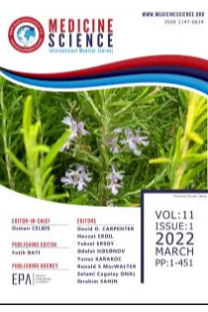Evaluation of the filiation team in terms of employee satisfaction and anxiety-depression scale in the pandemia process
Evaluation of the filiation team in terms of employee satisfaction and anxiety-depression scale in the pandemia process
___
- 1. McAlonan GM, Lee AM, Cheung V, et al. Immediate and sustained psychological impact of an emerging infectious disease outbreak on health care workers. Can J Psychiatry. 2007;52:241-247.
- 2. Huang J, Liu F, Teng Z, et al. Care for the psychological status of frontline medical staff fighting against COVID-19. Clin Infect Dis. 2020;71:3268-9
- 3. Kang L, Ma S, Chen M, et al. Impact on mental health and perceptions of psychological care among medical and nursing staff in Wuhan during the 2019 novel coronavirus disease outbreak: a cross-sectional study. Brain Behav Immun. 2020;87:11-7.
- 4. McMahon SA, Ho LS, Brown H, et al. Healthcare providers on the frontlines: a qualitative investigation of the social and emotional impact of delivering health services during Sierra Leone’s Ebola epidemic. Health Policy Plan 2016;31:1232–9.
- 5. Blake H, Bermingham F, Johnson G, Tabner A. Mitigating the psychological impact of COVID-19 on healthcare workers: A digital learning package. Int J Environ Res Public Health. 2020;17:2997.
- 6. Aytuğ Kanber N, Gürlek Ö, Çi̇çek H, Gözlükaya A. Satisfaction of health workers in a health institution. J Performance Quality Health. 2010;2:114- 126.
- 7. World Health Organization. Risk assessment and management of exposure of health care workers in the context of COVID-19. https://apps.who. int/iris/bitstream/handle/10665/331496/WHO-2019-nCov-HCW_risk_ assessment-2020.2-eng.pdf. access date 7 August 2021.
- 8. Gupta S, Sahoo S. Pandemic and mental health of the front-line healthcare workers: a review and implications in the Indian context amidst COVID-19. Gen Psychiatr. 2020;33:e100284.
- 9. Zhu Z. COVID-19 in Wuhan: Sociodemographic characteristics and hospital support measures associated with the immediate psychological impact on healthcare workers. EClinicalMedicine. 2020;24:100443.
- 10. Kang L, Li Y, Hu S, et al. The mental health of medical workers in Wuhan, China dealing with the 2019 novel coronavirus. Lancet Psychiatry. 2020;7:14.
- 11. Department of Quality and Accreditation in Health, Employee Satisfaction Survey, https://kalite.saglik.gov.tr/TR,13444/guncel-rehberler.html, 27.07.2020
- 12. Aydemir Ö. Kırpınar İ, Satı T, et al. Reliability and validity study of the health anxiety scale for Turkish. Neuropsychiatry Archive, 2013;50:325-31.
- 13. Aydemir Ö, The validity and reliability study of the Turkish version of the hospital aAnxiety and depression scale. Turk J Psychiatry. 1997;8:280-7.
- 14. Tetik Büyükelçi D. A Study on the hospital anxiety and depression scale (HADS). Life Skills J Psychology. 2019;3:85-91.
- 15. Domagała A, Peña Sánchez JN, Dubas Jakóbczyk K. satisfaction of physicians working in polish hospitals-a cross-sectional study. int j environ res public health. 2018;15:2640.
- 16. Vural F, Dura AA, Fil Ş et al. Factors affecting satisfaction, retention and organizational commitment in healthcare professionals. Balikesir J Health Sciences. 2012;1:137-44.
- 17. Uyumaz, G., & Çokluk, Ö. Investigation of item order and grading differences in likert type scales in terms of psychometric properties and respondent attitudes. J Theoretical Educational Sci. 2016;9:400-25.
- 18. Domagała A, Bała MM, Peña-Sánchez JN, et al. Satisfaction of physicians working in hospitals within the European Union: state of the evidence based on systematic review. Eur J Public Health. 2019;29:232-41.
- 19. Nakışci̇ Kavas B , Develi̇ A. The effect of the COVID-19 pandemic on female health workers in the context of problems in working life. Int Anatolian J Social Sci. 2020;4:84-112.
- 20. Xiaoming X, Ming A, Su H, et al. The psychological status of 8817 hospital workers during COVID-19 Epidemic: A cross-sectional study in Chongqing. J Affect Disord. 2020;276:555-61.
- 21. Eki̇z T , Ilıman E , Dönmez E . Comparison of Individuals' health anxiety levels and perception of control of the covid-19 outbreak. Int J Health Management Strategies Research. 2020;6:139-54.
- 22. Ünalan E. Relationships between wental health, health anxiety and health behaviors in university students. Okan University Institute of Social Sciences, Master Thesis, Department of Psychology, Istanbul: 2014.
- 23. Karaoglu N, Karaoğlu KB, Yardımcı H. Are Health Perception and Health Anxiety Different in Social Fields and Medical Faculty Students? Example of Aegean and Necmettin Erbakan University. UTEK 2016: IX. National Medical Education Congress, Dokuz Eylül University, 21-23.04.2016, paper no: 62.
- 24. Munawar K, Choudhry FR. Exploring stress coping strategies of frontline emergency health workers dealing covid-19 in Pakistan: A Qualitative Inquiry. Am J Infect Control. 2020;49:286-92.
- 25. Özdelikara A, Ağaçdiken Alkan S, Mumcu N. Health Perception, Health Anxiety and Determination of Affecting Factors in Nursing Students. Bakirkoy J Med. 2018;14:275-82.
- 26. Liu S, Yang L, Zhang C, et al. Online mental health services in China during the COVID-19 outbreak. Lancet Psychiatry. 2020;7:17–8.
- 27. Vindegaard N, Benros ME. COVID-19 pandemic and mental health consequences: Systematic review of the current evidence. Brain Behav Immun. 2020;89:531-42.
- 28. Zhang WR, Wang K, Yin L, et al. Mental health and psychosocial problems of medical health workers during the COVID-19 epidemic in China. Psychother Psychosom. 2020;89:242-50.
- ISSN: 2147-0634
- Yayın Aralığı: 4
- Başlangıç: 2012
- Yayıncı: Effect Publishing Agency ( EPA )
Association of sarcopenia with geriatric syndromes and neutrophil / lymphocyte ratio
Hakan YAVUZER, Veysel SUZAN, Bahar BEKTAN KANAT
Mehmet Ali ERKURT, Emin KAYA, Emine HİDAYET, İrfan KUKU, Ayşe UYSAL, İlhami BERBER, Soykan BİÇİM, Ahmet KAYA, Ahmet SARICI, Mustafa ÖZGÜL
Yunus Emre TOPDAĞI, Ahmet Ziya ŞAHİN, Çağdaş DEMİROĞLU
Begüm KORUNUR ENGİZ, Murat Erdem GÜLTİKEN, Ayşegül AKAR, Durmuş BOLAT, Ertuğrul SUNAN, Ülkü ÇÖMELEKOĞLU, Neslihan ORMANCI
Posterior root tear of the medial and lateral meniscus on magnetic resonance imaging of 10,980 knee
Ömer Cahit ÇITIR, Osman DEMİR, Orhan BALTA, Eyüp Çağatay ZENGİN, Mehmet Burtaç EREN, Harun ALTINAYAK
Didem ŞİMŞEK KÜÇÜKKELEPÇE, Ceyda BAŞOĞUL, Hacer ÜNVER
Blood cell indices in High-Grade Squamous Intraepithelial Lesions
Ali YAVUZCAN, Sinem KANTARCIOĞLU COŞKUN, Zerrin GAMSIZKAN, Gökhan ERDEMİR
Oğuz KAYA, Mustafa IŞIK, Burçin KARSLI, Orhan BÜYÜKBEBECİ, Ahmet ŞENEL, Nevzat GÖNDER
